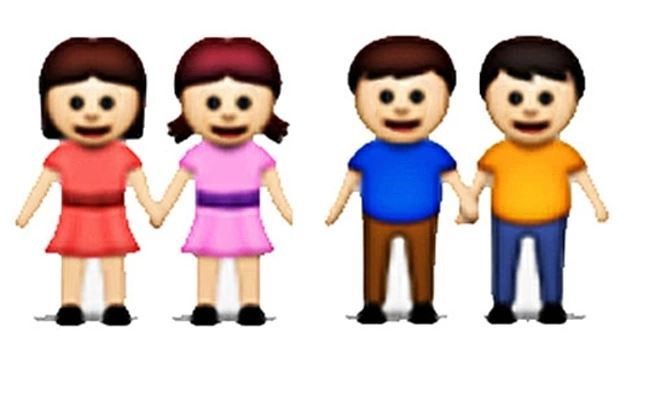Are emoji the new human rights frontier?

Out of the picture ... Indonesia has moved to block gay emoji from instant messaging services
Image: REUTERS/Lucy Nicholson
Stay up to date:
Indonesia
Should social media respect local culture? This is the question WhatsApp is grappling with following Indonesia’s move to block gay emoji from instant messaging service apps.
Indonesian authorities have already ordered LINE, a popular Japanese-based messaging app, to remove LGBT emoji from its Indonesian-language shop, and have said they will ask Facebook-owned WhatsApp to do the same.

“Social media must respect the culture and local wisdom of the country where they have (a) large number of users,” Information and Communication Ministry spokesman Ismail Cawidu told Associated Press.
The government took action after there was a social-media backlash in Indonesia against LINE over its gay-themed stickers, which are a type of picture emoji used by a number of messaging services.
It is not illegal to be gay in most of Indonesia, but LGBT rights are a sensitive issue in the Muslim-majority nation of more than 250 million people.
The move has sparked concern among human rights campaigners. In a letter to President Jokowi Widodo, Human Rights Watch highlighted recent reports of discrimination against LGBT Indonesians and said the government should "defend the fundamental rights of all Indonesians".
Indonesia isn’t the first country to attempt to block LGBT emoji. Russia was considering banning them, but the government decided last month that the symbols don’t violate its federal law against promoting homosexuality to minors.
Individuals and businesses can be fined or even jailed for breaking Russia’s anti-gay laws.
Can countries ban emoji?
It’s not that simple. LINE offers stickers in an online store and can remove them, but emoji are built into mobile operating systems. That makes getting rid of them a lot harder.
Apple added gay emoji to its operating system in 2012, and last year introduced emoji showing same-sex couples with children, and increased the racial diversity of the symbols, as shown below.

What about blocking apps?
Mobile messaging apps have been banned temporarily in several countries.
In December, mobile phone companies were ordered by a court in Brazil to block WhatsApp for two days because it said the messaging service had failed to comply with a criminal investigation.
WhatsApp has almost a billion users globally, of which more than 100 million are in Brazil. The messaging app is the most popular in the country and the ban, which also led to the service going down in Venezuela and Chile, prompted uproar on social media, including a Facebook post by Mark Zuckerberg urging Brazilians to speak out. A judge later lifted the suspension.

Last year, Bangladesh temporarily blocked two popular messaging services, Tango and Viber, on the grounds that anti-government protesters were using them to rally supporters and coordinate demonstrations.
Meanwhile, controversial new legislation in the United Kingdom could see WhatsApp, Snapchat, iMessage and other popular apps that use encryption forced to hand over some messages to British intelligence agencies. If they refuse, they could be banned in the UK under the Communications Data Bill, according to media reports.
Don't miss any update on this topic
Create a free account and access your personalized content collection with our latest publications and analyses.
License and Republishing
World Economic Forum articles may be republished in accordance with the Creative Commons Attribution-NonCommercial-NoDerivatives 4.0 International Public License, and in accordance with our Terms of Use.
The views expressed in this article are those of the author alone and not the World Economic Forum.
Forum Stories newsletter
Bringing you weekly curated insights and analysis on the global issues that matter.
More on Equity, Diversity and InclusionSee all
Andrea Willige
February 26, 2025
Naoko Tochibayashi and Mizuho Ota
February 17, 2025
David Elliott
February 3, 2025
Julie Linn Teigland
January 23, 2025



